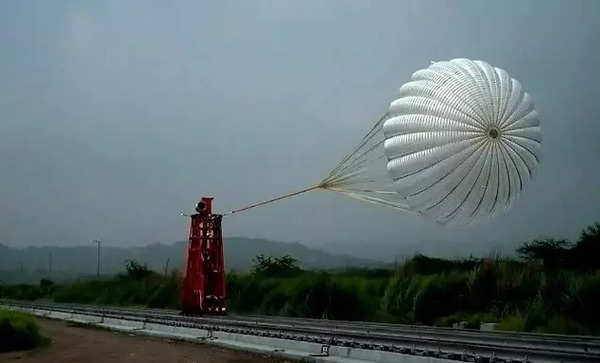The tests were conducted in collaboration with Aerial Delivery Research and Development Establishment (ADRDE) of the DRDO.
“Gaganyaan entails safe transportation of astronauts to space and back. A crucial component of this mission is the deployment of drogue parachutes which play a pivotal role in stabilising the crew module and reducing its velocity to a safe level during re-entry,” Isro said.

Drogue parachutes, packed within pyro-based devices known as mortars, are ingeniously designed to eject parachutes into the air upon command. These conical ribbon-type parachutes, boasting a diameter of 5.8 metres, employ a single-stage reefing mechanism, ingeniously minimising canopy area and mitigating opening shock, ensuring a smooth and controlled descent.
“During the three comprehensive tests, a range of real-world scenarios were simulated to rigorously evaluate the performance and reliability of the drogue parachutes. The first test simulated the maximum reefed load, marking a groundbreaking introduction of reefing in a mortar-deployed parachute within India. The second test emulated the maximum disreefed load, while the third test showcased the deployment of the drogue parachute under conditions mirroring the maximum angle of attack experienced by the Crew Module during its mission,” Isro added.
These tests serve as a critical qualification milestone for the drogue parachutes, confirming their readiness for integration into the upcoming test vehicle-D1 mission.
“Earlier this year, RTRS tests of pilot and apex cover separation parachutes were also conducted, further accentuating the progress of the Gaganyaan mission’s parachute system development. The intricate parachute sequence for Gaganyaan crew module’s deceleration system encompasses a total of 10 parachutes,” Isro said.
The sequence commences with the deployment of two apex cover separation parachutes, followed by the stabilisation achieved through the deployment of two drogue parachutes.
“Upon release of the drogue parachutes, the mission transitions into the extraction phase, with three pilot chutes individually extracting three main parachutes, a pivotal step in reducing the Crew Module’s speed to safe levels for a secure landing,” Isro said.

